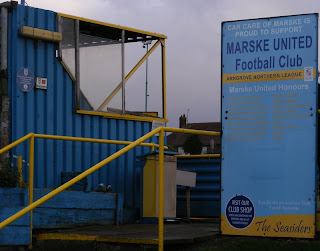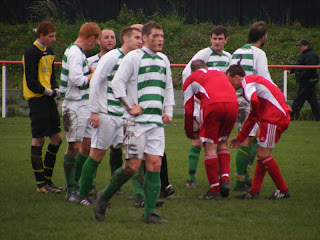 Newcastle United's Shola Ameobi, Gateshead midfielder Kris Gate and Carlisle's ex-Hamilton striker Richard Offiong are just three of the Walker Central players who graduated to the professional game. The club was founded by ex-Newcastle scout Brian Clark and his namesake Lee, the Newcastle and Fulham midfielder turned Huddersfield manager, in 1988 to provide football for young players in Newcastle's economically deprived East End. Northern Alliance Premier Division champions in 2001, 2008 and 2009, this season has been more of a struggle for the men's senior team - one of 20 male and female sides playing under the Walker Central name - who started the afternoon fourteenth in the league, 22 points adrift of runaway leaders Alnwick Town.
Newcastle United's Shola Ameobi, Gateshead midfielder Kris Gate and Carlisle's ex-Hamilton striker Richard Offiong are just three of the Walker Central players who graduated to the professional game. The club was founded by ex-Newcastle scout Brian Clark and his namesake Lee, the Newcastle and Fulham midfielder turned Huddersfield manager, in 1988 to provide football for young players in Newcastle's economically deprived East End. Northern Alliance Premier Division champions in 2001, 2008 and 2009, this season has been more of a struggle for the men's senior team - one of 20 male and female sides playing under the Walker Central name - who started the afternoon fourteenth in the league, 22 points adrift of runaway leaders Alnwick Town. Defending champions Harraby Catholic Club, footballing representatives of "Carlisle's most exciting hotspot", bookended Walker's title wins with two of their own, though an indifferent start to the season has left them fifth. When we arrive they're finishing off a game of bibs versus strips in the goalmouth while the referee has a chat with his linesmen in the centre circle. A rust-spotted railing and some pavement stones go round the pitch, when the teams finish warming up the equipment is locked in the same portakabin where the dugouts are kept, and every time the ball goes out a player has to wade through knee-high undergrowth to retrieve it.
Defending champions Harraby Catholic Club, footballing representatives of "Carlisle's most exciting hotspot", bookended Walker's title wins with two of their own, though an indifferent start to the season has left them fifth. When we arrive they're finishing off a game of bibs versus strips in the goalmouth while the referee has a chat with his linesmen in the centre circle. A rust-spotted railing and some pavement stones go round the pitch, when the teams finish warming up the equipment is locked in the same portakabin where the dugouts are kept, and every time the ball goes out a player has to wade through knee-high undergrowth to retrieve it. Harraby have a goal struck off when a forward strays offside but take the lead when a pull back finds an unmarked player on the edge of the box. "You've got to track him, man," a defender shouts. The response from his teammate is measured: "Fuck off, you. You're the same every week. You're shite." Harraby shoot against the outside of the net and have another goal disallowed before Walker have a chance to regroup. With no support from midfield, their one man up front manages enough flicks and feints to look reasonably promising, but you get the impression he could play for another 48 hours before threatening to score a goal.
Harraby have a goal struck off when a forward strays offside but take the lead when a pull back finds an unmarked player on the edge of the box. "You've got to track him, man," a defender shouts. The response from his teammate is measured: "Fuck off, you. You're the same every week. You're shite." Harraby shoot against the outside of the net and have another goal disallowed before Walker have a chance to regroup. With no support from midfield, their one man up front manages enough flicks and feints to look reasonably promising, but you get the impression he could play for another 48 hours before threatening to score a goal.Walker throw a second man forward after half time and try playing the ball through the centre of midfield. It's Harraby who still look the most likely to score, though - not least when Walker's keeper, whose handling has been jittery all game, fumbles a catch and scoops it onto the bar. "Push on!" comes the shout from the touchline, but the only chance the home team get is struck wildly into branches over by the corner flag.
 With planning permission for a 50-seater covered stand and floodlights to be erected, the situation looks more promising off the pitch than on it for Walker. Their eventual aim is promotion to the Northern League. In the meantime they'll keep looking for the next Ameobi.
With planning permission for a 50-seater covered stand and floodlights to be erected, the situation looks more promising off the pitch than on it for Walker. Their eventual aim is promotion to the Northern League. In the meantime they'll keep looking for the next Ameobi.Admission: Free
Date: 30th October 2010















































